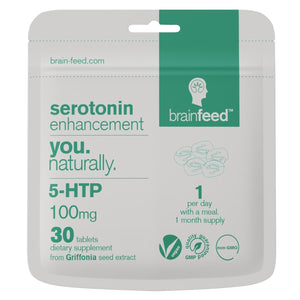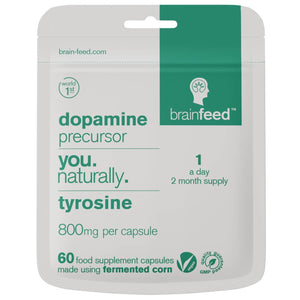Why does chocolate make you happy? Top 5 benefits of eating chocolate
filter
Key points
- Why does chocolate make you happy? It boosts serotonin & dopamine
- Dark chocolate is also suggested to lower the stress hormone cortisol
- Optimal chocolate intake is 30-60g daily of 70-85% dark chocolate or less
Chocolate, the delectable pick-me-up, has been enjoyed by humans for over 3000 years. In fact, the average global consumption of chocolate in 2022 was 7.5 million tons, which is roughly equal to the weight of 7.5 million cows [1 Trusted Source 2024 - Dame Cacao 3rd-party source 31 Current Chocolate Statistics (Market Data 2024) ] !
A bite of the velvety treat can instantly put you in a good mood. What is the science behind the joyous effects of chocolate on the brain? Chocolate contains 300-500 natural chemicals [2 Trusted Source 2022 - Nutrients Systematic and meta-analysis Cyrcadian Rhythm, Mood, and Temporal Patterns of Eating Chocolate: A Scoping Review of Physiology, Findings, and Future Directions ] , some of which are responsible for delivering the mental health benefits of chocolate. Read on to find out why chocolate makes you happy.
What are 5 benefits of eating chocolate?
Chocolate contributes to:
- feeling better,
- feeling calmer,
- experiencing pleasure,
- feeling motivated, and
- nourishing brain cells.
Chocolate impacts you in 3 different ways to provide you with all these benefits. Let’s take a look at what happens when you take a bite of the delicious velvety bar.
Why do I feel better after eating chocolate?
Providing you with comfort and satisfaction, chocolate can lift your mood by bringing joy to your life. There are interesting psychological elements in place when it comes to chocolate uplifting your mood. Imagine having a long, stressful day at work and coming home to a mouthwatering slice of chocolate cake. The comfort of chocolate can help relieve the stress from the long day you’ve just had[3 Trusted Source 2014 - International Journal of Health Sciences Human study Effects of chocolate intake on Perceived Stress; a Controlled Clinical Study ] . The texture, taste and smell of chocolate are also highly desirable, often bringing joy and thus improving your mood.
Why does chocolate lift your mood?
Some of the compounds released by chocolate can help produce and evoke a release of positive brain chemicals. Does chocolate release happy hormones? The happiness chemicals like serotonin and dopamine get produced and released the most, however, chocolate also affects those that can have a pain-relieving effect, which can add to the feel-good reaction[2 Trusted Source 2022 - Nutrients Systematic and meta-analysis Cyrcadian Rhythm, Mood, and Temporal Patterns of Eating Chocolate: A Scoping Review of Physiology, Findings, and Future Directions ] . Let’s take a closer look at how eating chocolate supports these processes in your body.
1. Does eating chocolate release serotonin?
Chocolate’s good mood is often attributed to enhancement in your happiness brain chemical, serotonin. A review of 9 studies on the relationship between chocolate and serotonin affirmed that consuming chocolate could have a positive effect on your mood for a short time (3 days)[4 Trusted Source 2021 - Critical Reviews in Food Science and Nutrition Systematic and meta-analysis The effect of cocoa-rich products on depression, anxiety, and mood: A systematic review and meta-analysis ] . A study found that those who consumed 30g of 85% dark chocolate (85% is the cocoa content) for 3 weeks reported better mood scores[5 Trusted Source 2022 - The Journal of Nutritional Biochemistry Human study Consumption of 85% cocoa dark chocolate improves mood in association with gut microbial changes in healthy adults: a randomized controlled trial ] .
Chocolate contains serotonin’s building block, called tryptophan (a natural nutrient). If you are thinking of boosting your serotonin levels by consuming multiple bars of chocolate, think again. There are only 0.39 grams of tryptophan in 30 grams of dark chocolate (70-85% cocoa content)[6 Trusted Source 2012 - Journal of Chromatography Systematic and meta-analysis Determination of serotonin and its precursors in chocolate samples by capillary liquid chromatography with mass spectrometry detection ] . Considering that your brain uses a small amount of ingested tryptophan to make serotonin, it is unrealistic to expect chocolate alone to bring a big surge in your serotonin levels[7 Trusted Source 2021 - International Journal of Molecular Sciences Systematic and meta-analysis The Multifaceted Role of Serotonin in Intestinal Homeostasis ] . An easier, more efficient way to make serotonin is through taking its direct building block, 5-htp which is found in honey and mushrooms. Once tryptophan enters the brain, it is converted to 5-htp which is then converted to serotonin. brain feed has produced the world’s smallest dense tablet of 100mg 5-htp that can naturally and safely increase serotonin levels.
2. Does eating chocolate increase dopamine?
Chocolate helps your brain release your reward and pleasure brain chemical dopamine. Animal studies found strong activation of dopamine-producing areas upon chocolate intake confirming that chocolate releases dopamine upon consumption[8 Trusted Source 2020 - Scientific Reports Animal study Involvement of the Nucleus Accumbens in Chocolate-induced Cataplexy ] . Your brain is wired to pursue pleasure and repeated performances of acts that bring pleasure. Fat and sugar are two of the most palatable components that make some foods like chocolate so sought-after. This activates the dopamine system and uplevels chocolate’s rewarding potential[9 Trusted Source 2019 - Nutrients Human study Increasing Chocolate’s Sugar Content Enhances Its Psychoactive Effects and Intake ] .
For chocolate to release your pleasure and reward chemical dopamine, your brain needs to produce enough of it. A healthy way to increase your dopamine levels is by consuming its building block, tyrosine (a type of nutrient). Apart from some protein-rich foods, it can be found in supplemental forms for a safe and efficient production of dopamine. brain feed has created the world’s 1st natural 800mg tyrosine capsule from fermented corn.
Can chocolate affect your mental health?
Given that chocolate affects the brain chemicals involved in mental health, researchers started examining its impact and found that chocolate helps improve multiple symptoms and regulate your mental health. Results of studies on dark chocolate and anxiety symptoms, depressive episodes and stress hormone levels provide a good reference for the benefits of cocoa in protecting your mental health. Let’s take a look at them.
Is chocolate a natural antidepressant?
Multiple studies say yes. Mood-boosting effects of chocolate were supported by a study of over 13,000 participants, which revealed that those who consumed dark chocolate had an almost 60% lower risk of depression compared to those who avoided chocolate[10 Trusted Source 2019 - Depression and Anxiety Human study Is there a relationship between chocolate consumption and symptoms of depression? A cross‐sectional survey of 13,626 US adults ] . Chocolate is also rich in a category of beneficial plant compounds called flavonoids which nourish brain cells and help regulate your mood long-term. A review of 36 studies showed that those with a high intake of flavonoids have better resolution of depressive symptoms, due to their brain protective effects[11 Trusted Source 2021 - Antioxidants Systematic and meta-analysis Exploring the Impact of Flavonoids on Symptoms of Depression: A Systematic Review and Meta-Analysis ] .
Why does chocolate calm you down?
Studies show that dark chocolate is a good stress buffer. Throughout the years, research has suggested that the cocoa compounds that keep your body in a harmonious balance, such as antioxidants and anti-inflammatory compounds, can reduce stress and help calm you down by lowering the levels of the stress hormone cortisol[3 Trusted Source 2014 - International Journal of Health Sciences Human study Effects of chocolate intake on Perceived Stress; a Controlled Clinical Study ] ,[12 Trusted Source 2014 - Journal of the American College of Cardiology Human study Dark Chocolate Intake Buffers Stress Reactivity in Humans ] ,[13 Trusted Source 2018 - Journal of Nutritional Sciences and Dietetics Human study Effects of sugar-free, αs1-casein–enriched chocolate on stress: based on salivary cortisol measurement and questionnaire data collection ] .
Does dark chocolate really help anxiety?
A review of 9 studies examining cocoa benefits found that cocoa-rich products help your anxiety[4 Trusted Source 2021 - Critical Reviews in Food Science and Nutrition Systematic and meta-analysis The effect of cocoa-rich products on depression, anxiety, and mood: A systematic review and meta-analysis ] . The results show that cocoa-derived food may improve affect and mood in the short term.
While chocolate is far from a cure, enjoying a small amount of high-quality dark chocolate in moderation can sweeten your mood and support overall mental well-being.
How much 85% dark chocolate per day?
The recommended amount of dark chocolate per day is anywhere from 30 to 60 grams[14 Trusted Source 2022 - Cleveland Clinic 3rd-party source Dark Chocolate Health Benefits ] . Surprised it’s that much? Well, the reason why dark chocolate is applauded for its health benefits is due to its high flavonoid content. Dark chocolate can contain almost 143% more flavonoids than milk chocolate, has less sugar and more fat and is thus considered a healthier sweet snack[15 Trusted Source 2011 - Antioxidants & Redox Signaling Systematic and meta-analysis Cocoa and Chocolate in Human Health and Disease ] . Still, to get the mood benefits of chocolate it’s important to be aware of the amounts of the building blocks to your happiness chemicals you get from the recommended daily amount of 85% dark chocolate.
This World Chocolate Day, pick a bar of dark chocolate and bask in the joy of a good mood and great brain health.
References
[1] Max (2024). 31 Current Chocolate Statistics (Market Data 2024). Dame Cacao. https://damecacao.com/about-dame-cacao/
[2] Garbarino, S., Garbarino, E., & Lanteri, P. (2022). Cyrcadian Rhythm, Mood, and Temporal Patterns of Eating Chocolate: A Scoping Review of Physiology, Findings, and Future Directions. Nutrients, 14(15), 3113. https://www.mdpi.com/2072-6643/14/15/3113
[3] Al Sunni, A., & Latif, R. (2014). Effects of chocolate intake on Perceived Stress; a Controlled Clinical Study. International Journal of Health Sciences, 8(4), 393–401. https://www.researchgate.net/publication/273700581_Effects_of_Chocolate_Intake_on_Perceived_Stress_A_Controlled_Clinical_Study
[4] Fusar-Poli, L., Gabbiadini, A., Ciancio, A., Vozza, L., Signorelli, M. S., & Aguglia, E. (2022). The effect of cocoa-rich products on depression, anxiety, and mood: A systematic review and meta-analysis. Critical Reviews in Food Science and Nutrition, 62(28), 7905–7916. https://www.tandfonline.com/doi/full/10.1080/10408398.2021.1920570
[5] Shin, J.-H., Kim, C.-S., Cha, L., Kim, S., Lee, S., Chae, S., Chun, W. Y., & Shin, D.-M. (2022). Consumption of 85% cocoa dark chocolate improves mood in association with gut microbial changes in healthy adults: a randomized controlled trial. The Journal of Nutritional Biochemistry, 99, 108854. https://www.sciencedirect.com/science/article/pii/S0955286321002746?via%3Dihub
[6] Guillén-Casla, V., Rosales-Conrado, N., León-González, M. E., Pérez-Arribas, L. V., & Polo-Díez, L. M. (2012). Determination of serotonin and its precursors in chocolate samples by capillary liquid chromatography with mass spectrometry detection. Journal of Chromatography A, 1232, 158–165. https://www.sciencedirect.com/science/article/abs/pii/S0021967311017389?via%3Dihub
[7] Koopman, N., Katsavelis, D., Hove, A. S. ten, Brul, S., de Jonge, W. J., & Seppen, J. (2021). The Multifaceted Role of Serotonin in Intestinal Homeostasis. International Journal of Molecular Sciences, 22(17), 9487. https://www.mdpi.com/1422-0067/22/17/9487
[8] Su, J., Li, Z., Yamashita, A., Kusumoto-Yoshida, I., Isomichi, T., Hao, L., & Kuwaki, T. (2020). Involvement of the Nucleus Accumbens in Chocolate-induced Cataplexy. Scientific Reports, 10(1), 4958.https://www.nature.com/articles/s41598-020-61823-4
[9] Casperson, S. L., Lanza, L., Albajri, E., & Nasser, J. A. (2019). Increasing Chocolate’s Sugar Content Enhances Its Psychoactive Effects and Intake. Nutrients, 11(3), 596. https://www.mdpi.com/2072-6643/11/3/596
[10] Jackson, S. E., Smith, L., Firth, J., Grabovac, I., Soysal, P., Koyanagi, A., Hu, L., Stubbs, B., Demurtas, J., Veronese, N., Zhu, X., & Yang, L. (2019). Is there a relationship between chocolate consumption and symptoms of depression? A cross‐sectional survey of 13,626 US adults. Depression and Anxiety, 36(10), 987–995. https://onlinelibrary.wiley.com/doi/10.1002/da.22950
[11] Ali, S., Corbi, G., Maes, M., Scapagnini, G., & Davinelli, S. (2021). Exploring the Impact of Flavonoids on Symptoms of Depression: A Systematic Review and Meta-Analysis. Antioxidants, 10(11), 1644. https://www.mdpi.com/2076-3921/10/11/1644
[12] Wirtz, P. H., Von Känel, R., Meister, R. E., Arpagaus, A., Treichler, S., Kuebler, U., Huber, S., & Ehlert, U. (2014). Dark Chocolate Intake Buffers Stress Reactivity in Humans. Journal of the American College of Cardiology, 63(21), 2297–2299. https://www.sciencedirect.com/science/article/pii/S0735109714015836?via%3Dihub
[13] Yeganehzad, S., Pahlevanloo, A., Kiumarsi, M., Zayerzadeh, A., Sadjadi, S.-A., Shahidi, M., & Nadali, N. (2018). Effects of sugar-free, αs1-casein–enriched chocolate on stress: based on salivary cortisol measurement and questionnaire data collection. Journal of Nutritional Sciences and Dietetics. https://jnsd.tums.ac.ir/index.php/jnsd/article/view/220
[14] Dark Chocolate Health Benefits (2022). Cleveland Clinic. https://health.clevelandclinic.org/dark-chocolate-health-benefits
[15] Katz, D. L., Doughty, K., & Ali, A. (2011). Cocoa and Chocolate in Human Health and Disease. Antioxidants & Redox Signaling, 15(10), 2779–2811. https://www.liebertpub.com/doi/10.1089/ars.2010.3697


 alertness
alertness
 cognition
cognition
 sleep
sleep
 wellbeing
wellbeing







Leave a comment
Open tab